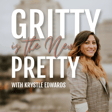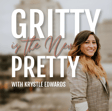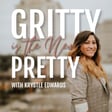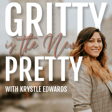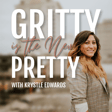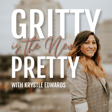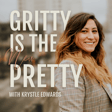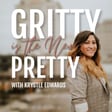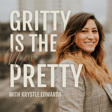Become a Creator today!Start creating today - Share your story with the world!
Start for free
00:00:00
00:00:01

5: Episode 5: Erin Dietz EAMP & Owner of Blue Peacock Acupuncture
Grit and Grind podcast is brought to you by Grit City Women - A female forward organization that nurtures a creative approach to empowering female entrepreneurs, small business owners. and leaders in Tacoma. Join host Krystle Edwards and Grit City Women Charter Member Erin Dietz while we discuss:
Learn more about Erin:
- Impact of COVID 19 on Blue Peacock Acupuncture
- Adapting to the new normal
- Tips for in home stress relief
- Scaling back into business
Learn more about Erin:
- Website : https://www.bluepeacockacupuncture.com/
- Insta : @bluepeacockacupuncture
- Facebook: Blue Peacock Acupuncture
Transcript
Introduction to Podcast and Guest
00:00:10
Speaker
Welcome to Grit and Grind, a podcast by Grit City Women, where gritty is the new pretty. This is Grit City Women founder and host Crystal Edwards. In today's podcast, episode five, we have Grit City Women charter member, Erin Dietz, owner and founder of Blue Peacock Acupuncture. Welcome, Erin. Hi, thank you. Well, thank you for being on the podcast. Obviously, you're
00:00:37
Speaker
a long time member.
Erin's Background and Specialization
00:00:38
Speaker
So do you want to go ahead and introduce yourself and share a little bit about yourself? Sure. I'm Erin. I have pretty much been with Grit City Women from the start really. It's been really such a wonderful group to be with and I've learned a lot and gotten a lot of really helpful information.
00:00:59
Speaker
from your group, so I'm grateful for that. Personally, I have been an acupuncturist since 2008, and I'm the owner of Blue Peacock Acupuncture. Originally started out in Seattle, Washington, and I was there for about 10 years, a little over.
00:01:19
Speaker
And then I moved to Tacoma back in 2016, bought a house and decided to start my practice here. So I have been here since then and it's just been the best move I've ever made.
00:01:35
Speaker
I miss my Seattle community, but I love my Tacoma community. And business is just really, really ground for me here. So it's been wonderful. I treat mainly pain conditions, including headaches. A lot of patients come in with headaches. I love treating headaches and migraines. Abdominal issues, digestion issues, things like that. Stress and anxiety is a huge one that I treat, which goes along with everything else. Pain and headaches and digestion.
00:02:04
Speaker
A lot of times people being stressed and anxious have a lot of things that come up through that. So those are main things that I treat in my practice and then also treat pretty much everything else that you can treat with acupuncture.
Adapting Practice Due to COVID-19
00:02:18
Speaker
So how have you adapted since the stay home, stay healthy order that's been put into place because of the COVID-19? So you've had to essentially close your doors, right?
00:02:31
Speaker
Yep, yeah I actually closed my doors a couple days before they announced the closure just because I was really worried. I figured that they were going to close everything down and I have gotten a lot of guidance from my acupuncture association and they have just been so wonderful and
00:02:57
Speaker
I love my medicine and I love acupuncturists because
00:03:04
Speaker
We are really thinking about what it means to our patients to be working or not be working. And we're considered essential health care. So we can be working right now, but we know that we are putting people at risk for doing that. And really, the only people that should be working at this point are people doing essential treatments, not essential workers.
00:03:33
Speaker
as far as like health care, chiropractic, PT, acupuncture, all those different modalities. So we should only be treating people that are not going to be going to, you know, we're trying to keep them away from hospitals, we're trying to keep them out of ER, we're trying to keep them away from addictions. So if they're on pain medications, we don't want them to be
00:03:57
Speaker
you know, overdoing anything with pain medication. So just really trying to keep people on track but not taking as normal business. So we've gotten so much guidance from my association and we've all pretty much closed down. So it's been pretty crazy but necessary I think.
00:04:21
Speaker
So I've taken a lot of classes on telehealth, so I'm learning a completely new way of practicing, which is really scary. But you know, I have a toolbox and it's basically dealing with acupuncture needles and doing needle treatments.
00:04:37
Speaker
and now I can't do that. So I have to go into all the other things that I know and that I've learned and that I use but I don't use as often. So that's going to be like nutrition advice, which I do often but not as much as I'm going to now, using more of like lifestyle, qigong,
00:04:58
Speaker
breathing exercises, stress reduction exercises, lifestyle changes, and just kind of listening. I can offer acupressure, so doing that kind of thing through video instead of at the office.
00:05:14
Speaker
What does that
Embracing Telehealth Innovations
00:05:15
Speaker
look like? So it's basically having just a virtual treatment. So we would be in a private treatment one to one through our video chat. And then it would basically be an interview patient telling me what's going on, anything from, you know, knee pain or back pain to anxiety and stress.
00:05:36
Speaker
And then I can prescribe herbal remedies. I don't work a ton with herbs, so I will do more like patent herbs where you take the little pills. And then supplements. I can prescribe lots of different supplements and I have an online page that they can buy right from me and then it goes right to them. So it just ships right to your house. I can ship CBD creams, which a lot of my patients love so much for any pain conditions.
00:06:06
Speaker
and also like CBD oil and stuff like that. And then just meditation exercises, I can go through that with them, send a bunch of just different information depending on what the patient needs and what they're going through, you know, everybody's going to be really different. So also leading through an acupressure appointment, so kind of teaching people where I would normally put needles. You can either use little ear seeds with stick-on tape that you can purchase or
00:06:35
Speaker
You can even use like a marker and just mark them and then press them, you know, press these points that I would normally do, which can be really helpful too. So. Hmm. So it sounds like if you are a regular patient for acupuncture, there's some, some things you can do to tie over until you can get back in.
00:06:53
Speaker
And you know, I really feel like this pandemic has changed so much and I don't feel like anything's really going to be the same after this. Things are going to be different.
00:07:10
Speaker
I think we're just all gonna have to change. You know, everybody's gonna have to change a little bit. Everybody to be successful at this point in time is gonna have to think out of the box a little bit and evolve with these changes that are gonna be happening. And I think a big part of that for me is gonna be being able to offer telehealth. So if somebody can't come into me for whatever reason in the future, I can still help them and give them really good resources that can help them through their time.
00:07:40
Speaker
even just through them, you know, video chatting with me. So I think it's going to be a really positive thing for my business even after this is done. It's just a really difficult time and it's really hard not to see my patients and be there for them in person right now, but you know, just trying to do what I can for, for my patients too. So have they,
00:08:04
Speaker
Have they responded to the telehealth demand? I mean, are they practicing what you're teaching them in the telehealth stuff? So far, I've just rolled it out. So right now, I think with the fact that we're probably going to start opening things up a bit, I think people are kind of holding off on it. And I've only sent out one email from it so far, just kind of introducing it.
00:08:32
Speaker
So I have only so far been taking all the courses setting myself up setting up my telehealth program through my practice management so that I'm actually able to do it hit the compliant and then you know setting up forms and how to book and all these different things and even just
00:08:49
Speaker
information that I can get for my patients. So I haven't fully integrated it in yet, but that's going to be a process too of just, you know, figuring out how to get patients to feel comfortable with that because it's so new and probably not, it's probably kind of confusing to them on like how I would even be able to treat. So just trying to get the word out and make people feel a little bit more comfortable with it at this point. I definitely agree.
00:09:18
Speaker
with you on the fact that I don't think anything is going to be the same after this. And I think that a lot of these adjustments that we're making to the virtual world and virtual meetings and just operating virtually, I think it is going to be a good thing in a lot of ways for people that can't get out for whatever reason, you know, like you had mentioned.
00:09:43
Speaker
So I think it's a, it's a great way for us to sort of take that next step. I know that's something that we're doing with our community discussions. So it is a learning curve for me too on all of that stuff, but I do like that it gives other people the opportunity to be engaged.
Insurance Support for Telehealth
00:10:01
Speaker
Definitely.
00:10:03
Speaker
Yeah, it's pretty cool that insurance right now is completely accepting telehealth as they're covering it. They're even, as far as like most of the insurance companies that I'm seeing, they're even waiving co-pays and co-insurance and they're just covering it. So that's a big plus for people to be able to reach out and get help that they need without having to worry about extra costs too. I was going to ask that. I was going to ask how the insurance companies were adapting to that.
00:10:33
Speaker
That's really great. Yeah. Yeah. And they're actually relaxing different aspects of it too. Like you can use more portals as far as, you know, usually they're going to be really strict about HIPAA compliant portals. And mine is totally HIPAA compliant. It's through my acupuncture software. So I don't have to worry about that, but there are relaxing a lot of different things around it too. So it's, it's.
00:10:58
Speaker
Really good. Yeah. Good. What else have you had to do to adapt to what's happening right now? I don't have an income. So that looks pretty weird. I, you know, I financially, it's scary, but I have a little bit of savings that I'm living off of right now.
00:11:18
Speaker
I've tried applying for the EIDL loan, the economic injury disaster loan, I think is what it's called. And I haven't seen anything from that. I haven't gotten any information about it at all. I'm waiting to apply for the PPP loan of a paycheck protection program because I just don't want to take out loans. I just really don't want to do that. And then they're opening up unemployment insurance
00:11:48
Speaker
I believe on the 18th this Friday for self-employed individuals. So I'm definitely applying for that as soon as that gets updated. So hopefully that will at least help me pay my bills. So, you know, I'm doing that. And then like, I'm just, I'm like doing paint by numbers. Hanging out with my cats a lot.
00:12:17
Speaker
I fully broke my foot, so I broke my big toe, so I can't do an image anyways. I'm like, well I've got however many weeks to heal now from my tunnel. And then I fell and I hurt my other side of my foot, so I'm like hobbling around pretty much at home. So I've just been taking webinars and learning classes and like paint by numbers and you know, stuff like that, so.
00:12:50
Speaker
I love that. That's so great. I've been doing house stuff and it feels really overwhelming that I have all of this time to do all of the stuff that was on my wish list. And now it's like, I've got to put my money where my mouth is with it and actually do the work. Yeah.
00:13:17
Speaker
So have you been pretty isolated from most people? I know you said it's hard that you can't see your patients. Are you able to interact with anybody else?
00:13:27
Speaker
No, I live alone, so I talk to my cats a lot. I'm a nice named Adele. So I just, I call my friends. I basically, I have really long conversations on the phone with my friends right now, and I am
00:13:47
Speaker
really lucky because I really like being alone. I live alone, I have for a long time so it's not, I'm not like totally freaking out about you know being or anything. I had a little social distancing party with my neighbors the other day. We all were like in our fenced in yards and like standing on our porches like having drinks together so that was kind of cute and fun.
00:14:15
Speaker
Um, but otherwise I'm just, I'm just hanging out alone. I go to the grocery store here and there when I need it. But other than that, I'm pretty much alone. Yeah. Yeah. It's, I feel really lucky that my boyfriend, you know, is here with me and we pretty much live together at this point, but I have someone to be around. And normally I go to my job where I'm interacting with people all the time.
00:14:43
Speaker
And I'm just like, I don't know what I would do if I were that isolated. I like my alone time, but I also really do enjoy engaging with people and being extroverted and getting out and doing stuff. So I feel lucky in the sense that I do have somebody to be with. But I do text my family a lot and talk to them.
00:15:12
Speaker
Obviously, talking to you guys is helpful and stuff like that, but I do feel really bad for some people that are already feeling isolated before any of this even happened.
00:15:26
Speaker
I definitely try and keep up more with the people that are alone. So yeah, I have like my single girlfriends and my mom is, you know, she doesn't have anybody living with her or anything. So we talk a lot and yeah, it definitely gets a little weird being alone for so long without, you know, having anybody here. So yeah.
00:15:53
Speaker
you start doing some weird stuff. So what do you think your, what do you think that your operations are gonna look like when we start to open doors again?
Reopening Strategies Post-Pandemic
00:16:15
Speaker
Yeah, I don't know, but I imagine I'm going to start really slow. I have a feeling that people are going to be a little fearful of coming for a little while. I feel like for a lot of people, it's almost going to be like starting a new business again.
00:16:35
Speaker
and really building up to a point of being busy again. So for me, I'm gonna wear a mask for a while. I'm thinking about wearing scrubs to work so I can wash them all the time. And then I have to do different things in my clinic as far as like not using my nice cozy cushiony things under the bed because I'm just gonna
00:16:58
Speaker
You have to take that off and only use one sheet, you know Just like really take precautions for a few months until we really get this under control So things are gonna be different for a while and I think it's gonna take a while to build back the business to the point where it was before but you know, I think everybody's gonna go through that too, so
00:17:22
Speaker
I really like that. I think that's smart, you know, to approach it that way that you're still going to have to basically scale to getting somewhat back to normal with interactions and also with hygiene and how we
00:17:43
Speaker
clean our businesses and maintain our businesses and even our homes and all of that stuff. So I think that that's really smart. And I like that you're, you're thinking about that process and what's that going to look like to make your patients feel or your clients feel comfortable and stay safe.
00:18:03
Speaker
Yeah, I mean, when we all go back to work, it's still gonna be here, you know? It's still gonna be a fear that we're gonna have to deal with until we get a vaccine. So it's gonna be a long time of really having to live differently and take
00:18:21
Speaker
really extreme precautions that we didn't even really think about having to do before. So I think to really prepare ourselves we have to think about extra measures that we're going to be taking for quite a while when we go back.
00:18:35
Speaker
Yeah, I'm really hoping. My mind wants to be like, everything's going to be normal. It's fine. But I'm just, I don't know. I'm a little sad. I miss going out. I miss visiting local restaurants. I miss having our in-person events and having our speakers and stuff like that. I just really miss that energy because I just feel like you do feel that in-person energy when you're around someone.
00:19:06
Speaker
And that's something that I'm like, oh, like the virtual thing is great and I am jumping into it, but it's like, I don't know, like I just really like sitting around with people and feeling that energy feed off of one another. It makes me feel so much more energized and connected to, I'm talking to. So I don't know, like I'm just, I guess I'm kind of mourning that in a sense of,
00:19:35
Speaker
That's something I'm gonna have to figure out how to channel. Yeah, I mean, this isn't gonna be forever for sure. We're gonna be able to go back to that, but it's gonna just be...
00:19:44
Speaker
we're not going to be able to jump back into anything, you know, we're not going to be like, okay, everything's lifted, now we can go back to normal work, it's going to be a process and we will get there and we're going to, you know, I think this is really making people appreciate how important it is to be connected and face to face and have those personal interactions because
00:20:07
Speaker
They're so important to us as people and you know, we get so much out of them. So I think It'll be really really great once we can. Oh my gosh, even not having a paycheck right now I'm like if I just had some money. I just want to go support a local like vegan restaurant and buy food, you know, but I like don't have an income so I can't do that right now but
00:20:33
Speaker
I just want to support our local community so bad. And I feel so bad for everybody. And yeah, I can't wait until we can all go out for a beer and, you know, talk about everything. Yes. So I definitely, we had the Grit City Women Retreat on Vashon Island scheduled for May 16th. And I'm not sure that we're going to be hitting that marker because
00:21:01
Speaker
they'll probably what I think is going to happen is they're going to limit gatherings to like scale back into it the way we kind of came into it. So I have a feeling that big gatherings, you know, are going to be, you know, limited for a while and then eventually it'll get bigger. So I have no idea if we'll be able to actually do it but I will
00:21:27
Speaker
reschedule it to whenever we're able to actually have it. And I really think that that's gonna be a really fun time because we can all get together and the place that we're gonna be at is super nice and it's right on the water. And just to really kind of go over this experience, what we've learned, what we can do to help each other out and maybe prepare for something that might happen in the future.
00:21:56
Speaker
you know, just what kind of resources were beneficial, weren't beneficial, how to prep for that stuff. I think that's going to be super important and overall just the healing that a lot of people, the trauma that people have faced about being stressed for their business, stressed for their income, stressed for their family and
00:22:16
Speaker
You know, I think that that's super important because I definitely have spent a lot of time thinking about you guys and just, you know, what can I do to try to help? And so that leads me into my next question.
Supporting Blue Peacock Acupuncture
00:22:30
Speaker
So what can people do to support Blue Peacock acupuncture right now?
00:22:35
Speaker
Um, gosh, I guess for my own patients, it would be connecting with telehealth because I think it's a real good resource. Um, for people that have not seen me before, I think just, um,
00:22:54
Speaker
when you are ready, when we are ready to open back up, I would come and get a treatment. I mean, come get a treatment for stress. Come get a treatment for just being cooped up and unbalanced and freaked out, you know, because having your body relax and balanced and able to function better is just, it can do wonders for your own stress.
00:23:23
Speaker
your own well-being so think about acupuncture as a way to heal because that's really what it I mean it's your body's natural way of healing itself but it's an amazing beautiful medicine that is all internal and it's all you and it's a great way to to heal yourself through things like this so just considering acupuncture when things are getting more on track is good for me too
00:23:50
Speaker
Awesome. So if anybody wants to do acupuncture and they haven't done it yet and maybe they're feeling stressed, do you have any tips to offer them that they can do from home just right now? I would suggest looking into just doing meditation. The Calm app is really great. Have you heard of that?
00:24:12
Speaker
I haven't. Okay, it's CALM Calm app. It's a meditation app that you can get on your phone. And it's just really simple, really easy ways of meditating. And meditation can be so hard. If you've never meditated before, it is like you spend like a minute doing it and you're like, oh my god, I can't do it. All I'm doing is thinking about all these things and it's I'm stressed and it's really hard.
00:24:39
Speaker
So I don't suggest trying to do it on your own, but with an app where they really lead you through it, you can just relax your brain a little bit and that really helps. So I think that's probably the best thing you can do is find a few minutes in your day to meditate and just to, you know, calm your brain down a little bit.
00:25:00
Speaker
So calm up is really great. And then doing like Tai Chi, even finding Tai Chi on YouTube or yoga, like gentle balancing yoga is really good just to really stress. And then taking walks, things like that. Outside, getting outside, getting fresh air and taking walks is a good way to really stress too. Yeah, I like that. I use the, I've been using the Insight Timer. What is that? Some meditation stuff on it.
00:25:29
Speaker
But I don't do it during the day, which I probably should more, but I started listening to it at night when I go to bed. And I fall asleep so much faster just because I listened to that. And sometimes I'll listen to different meditations that focus on certain things and just depending on how I'm feeling. And I'll play it right next to, you know, my bed when I go to sleep and
00:25:59
Speaker
You're right. When you have a guided meditation, it really helps your brain focus on that. And then I just, I'm out. And I feel really relaxed. So that's something that I do at least at night to help me sleep. But I can definitely see where during the day, if you're feeling anxious, just spending some time listening to that, sitting. Yeah, that's good insight. All right. Well,
Contact Information
00:26:25
Speaker
If anybody wants to get a hold of you for maybe booking an appointment in the future or maybe following you, what's the best way to do that? Best way is just going to my website, bluepeacockacupuncture.com. And I have a book now appointment schedule, online schedule. That's super easy. I have my, you can contact me through email that way too, but booking online is the easiest one.
00:26:53
Speaker
really simple way of doing it. Thank you so much for joining us today and then obviously your support as a charter member. It's been phenomenal having you and I can't wait to see where everything goes kind of where this adventure leads now.
00:27:10
Speaker
So thank you. Thank you so much for everything. I've learned so much from people in Grit City Women, from your speakers, and it's just been such a good way to connect with really amazing, wonderful, awesome women.
00:27:29
Speaker
I have really appreciated that a lot. Thank you. That means so much. That's exactly what I wanted to do. So it feels really good to hear that, and I'm really appreciative of your support. Grit and Grind is powered by Melissa Newell, financial advisor for Edward Jones. To learn more about Grit City Women, visit gritcitywomen.com or follow us on Instagram at gritcitywomen, and we look forward to getting gritty with you.
